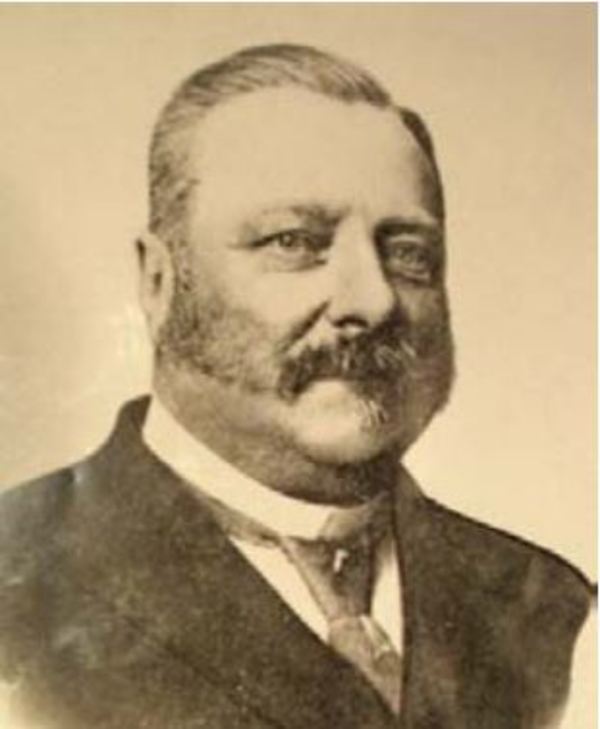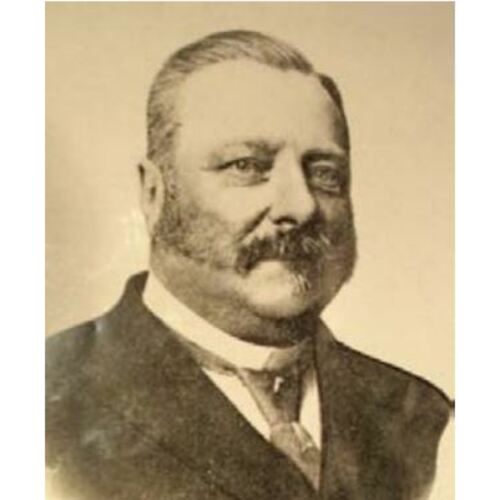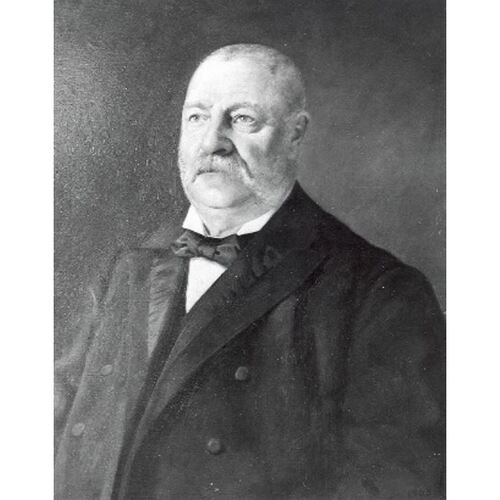
Source: Link
DAUBIGNY, VICTOR-THÉODULE, veterinarian and educator; b. 29 Feb. 1836 in Crillon, France, second son of François Daubigny, a farm-hand, and Joséphine Daubigny; m. first 28 Nov. 1859 Marie-Élise Chouquet (d. 19 Aug. 1872) in Arronville, France, and they had five children; m. secondly 23 April 1873 Sophie Laurier (d. 3 Aug. 1905) in Montreal; m. thirdly 7 Nov. 1905 Marie-Amanda Rouleau in Saint-François-de-Sales (Laval), Que.; d. 11 Dec. 1908 in Terrebonne, Que., and was buried four days later in the crypt of the parish church.
When he was 15, Victor-Théodule Daubigny abandoned his secondary studies at the boarding-school of the Institut Catholique de Beauvais and became an apprentice in a notarial office in Méru. He stayed there until he became principal assistant clerk at the age of 20. Exempted from military service by lot, he served as principal clerk for a notary in Héréville (Arronville) until he was 24. After his marriage he lived and worked on his father-in-law’s farm in Hérouville, but used his legal knowledge to purchase real estate. At 27 he set himself up as an insurance agent in Saint-Denis. After the vicissitudes of the Franco-German War, his independent and enterprising personality led him to seek his fortune in Canada.
In 1872 Daubigny set out alone from France, leaving his wife and two children on the farm in the care of his father-in-law. On 21 May, 11 days after sailing from Liverpool, England, he arrived at Quebec. From there he went on by train to Montreal, where he hoped to make use of his experience as a notarial clerk. This goal proved unattainable because his diplomas were not recognized; in addition his knowledge of English was inadequate, and to resume studying in that language at his age would have been difficult. The only French-language establishment in Montreal authorized to grant diplomas in law, the school of François-Maximilien Bibaud*, had closed in 1867. News came of another painful misfortune, the death of his wife and newborn child. He decided to remain in Canada and, falling back on his agricultural knowledge, he rented a farm. He remarried in 1873 and worked the land of his wife’s parents. At that time the Quebec government, realizing that the land in western Canada was better for growing grain, was advising farmers to abandon cereal crops and specialize in dairy farming. In 1876 this encouragement was matched by assistance to provide francophones with access to veterinary courses, which until then had been given only in English at McGill College.
In January 1877, although Daubigny by then was nearly 41, he became one of four students admitted to the French section of the Montreal Veterinary College, which was affiliated with McGill College. Duncan McNab McEachran*, the director of the veterinary school, recognized his skill in communication and in 1879, when his studies were completed, hired him to direct the French section. Daubigny continued in this capacity until 1885 and at the same time carried on a private practice with L.-H. Bergeron.
After Daubigny’s contract with the college expired, he and Orphir Bruneau, the professor teaching the practice of veterinary medicine, founded the École de Médecine Vétérinaire de Montréal, which they affiliated with Victoria University in Cobourg, Ont. In the course of the first year, however, Daubigny ended his partnership with Bruneau and entered into an agreement with Emmanuel-Persillier Lachapelle*, secretary of the faculty of medicine in the Université Laval at Montreal and co-founder of the city’s Notre-Dame Hospital, and with Hugues-E. Desrosiers, Salluste Duval*, and Norbert Fafard, to create the École Vétérinaire Française de Montréal. Officially founded on 4 April 1886, it opened on 30 September. Classes began on 4 October in a new building on Rue Craig (Rue Saint-Antoine), which was used as a residence, hospital clinic, pharmacy, and library. Some classes, such as chemistry, histology, and physiology, were taught at the Laval faculty of medicine on Rue Saint-Denis.
From 1886 to 1893 the veterinary schools of Bruneau and Daubigny not only competed against each other but suffered the repercussions of an even greater confrontation between Bishop Ignace Bourget* and Archbishop Elzéar-Alexandre Taschereau* as to the legitimacy of the Montreal branch of the Université Laval. The settlement of this dispute in 1893 brought about the closing of the École de Médecine Vétérinaire de Montréal.
At the age of 59, Daubigny renamed his institution, which was now located in premises formerly occupied by the faculty of medicine, and it became the École de Médecine Comparée et de Science Vétérinaire de Montréal. He also delegated many of his teaching responsibilities to his son François-Théodule Daubigny*, who had joined him in Canada in 1882 and had been a teaching veterinarian since 1889. As well, he decided to move to a large property in Terrebonne and to become involved in preventing the spread of animal disease, a pursuit being organized in the late 19th century.
From discoveries in the fields of asepsis, microbiology, and hygiene, the principles of prophylaxis against contagion were identified, and statutory control of epizootic diseases led to the rise of veterinary medicine. The government invited the best publicists to disseminate the new information among livestock breeders. An excellent speaker, Daubigny went around giving lectures on contagious diseases, animal hygiene, and animal husbandry. He did this mainly during the winter, on Sunday after mass, at first in places near Terrebonne; later he travelled by train to Rigaud and even to Chicoutimi. He also used tuberculin tests to detect bovine tuberculosis, and mallein tests to detect equine glanders on livestock farms. He performed necropsies to diagnose certain communicable diseases, recommended preventive hygiene, and administered vaccines.
In 1902 Victor-Théodule Daubigny was a founding member of the Association of Veterinary Surgeons of the Province of Quebec, now known as the Corporation des Médecins Vétérinaires du Québec, and he served as its president from 1904 to 1906. During these years he suffered personal problems – the death of his wife Sophie Laurier, deteriorating health, the onset of jaundice, frequent attacks of rheumatism, and respiratory difficulties. He severely limited his professional activity and became melancholiac. To overcome his solitude he remarried, and apparently thus improved his physical and mental health. Until a few weeks before his death, Daubigny retained his creative energy, carrying on his educational work among livestock breeders and the students at his school.
AC, Montréal, État civil, Catholiques, Saint-François-de-Sales (Laval), 7 nov. 1905. ANQ-M, CE1-1, 23 avril 1873. Arch. Départementales, Oise (Beauvais, France), État civil, Crillon, 1er mars 1836. Collège Vétérinaire de Montréal, Annuaire, 1883/84–1884/85. École de Médecine Comparée et de Science Vétérinaire de Montréal, Annuaire, 1896–97, 1909–10. École Vétérinaire Française de Montréal, Annuaire, 1888/89–1889/90. S. B. Frost, McGill University: for the advancement of learning (2v., Montreal, 1980–84), 1. C. A. Mitchell, “A note on the early history of veterinary science in Canada,” Canadian Journal of Comparative Medicine and Veterinary Science (Gardenvale [Sainte-Anne-de-Bellevue, Que.]), 2 (1938), no.4–4 (1940), no.7. Montreal Veterinary College, Annual announcement, 1881/82–1882/83. Univ. Laval, Annuaire (Québec), 1886–87. Rémy Véronési, “Victor-Théodule Daubigny (1836–1908), promoteur de l’enseignement vétérinaire francophone au Canada (Saint-Hyacinthe, Québec); sa vie, son œuvre” (thèse de
Revisions based on:
Arch. Départementales, Val d’Oise (Cergy-Pontoise, France), “État civil,” Arronville, 28 nov. 1859, 19 août 1872: archives.valdoise.fr/archives/recherche/etatcivil/n:42 (consulted 9 May 2019). Bibliothèque et Arch. Nationales du Québec, Centre d’arch. de Montréal, CE605-S2, 7 août 1905; CE606-S24, 15 déc. 1908. Que., Statutes, 1895, c.79. Univ. Laval, Annuaire, 1885–1886.
Cite This Article
Louis-Philippe Phaneuf, “DAUBIGNY, VICTOR-THÉODULE,” in Dictionary of Canadian Biography, vol. 13, University of Toronto/Université Laval, 2003–, accessed January 18, 2026, https://www.biographi.ca/en/bio/daubigny_victor_theodule_13E.html.
The citation above shows the format for footnotes and endnotes according to the Chicago manual of style (16th edition). Information to be used in other citation formats:
| Permalink: | https://www.biographi.ca/en/bio/daubigny_victor_theodule_13E.html |
| Author of Article: | Louis-Philippe Phaneuf |
| Title of Article: | DAUBIGNY, VICTOR-THÉODULE |
| Publication Name: | Dictionary of Canadian Biography, vol. 13 |
| Publisher: | University of Toronto/Université Laval |
| Year of publication: | 1994 |
| Year of revision: | 2021 |
| Access Date: | January 18, 2026 |




